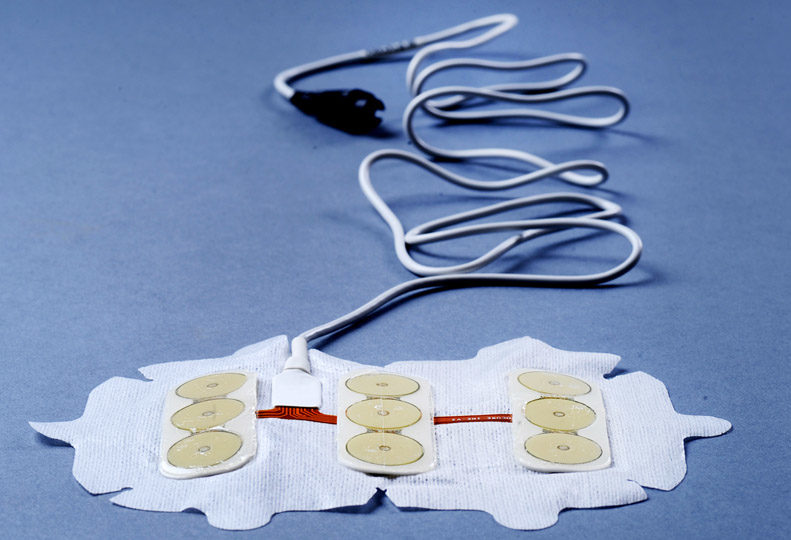
Home » Cancer Care Northwest debuts new technology
Cancer Care Northwest debuts new technology
Device shown to extend lives of patients with malignant brain tumors

September 8, 2016
Spokane-based Cancer Care Northwest, a physician-owned oncology practice, has introduced to the Inland Northwest what its physicians tout as a groundbreaking new technology that helps extend the lives of patients diagnosed with certain malignant brain tumors.
The technology, called Optune, is approved by the Federal Drug Administration to treat adult patients with aggressive brain malignancies called glioblastoma multiformes, says Dr. Srivalli Gopaluni, a Cancer Care Northwest medical oncologist.
Glioblastoma multiforme is the most common type of cancer that begins within the brain in adults. It grows rapidly, usually causing increased pressure in the brain, Gopaluni says. Symptoms of the disease can include headache, nausea, vomiting, seizures, drowsiness, weakness, memory or speech difficulties, and vision problems.
Patients with glioblastomas have potentially limited lifespans that sometimes can be counted in months or weeks, she says.
“Anything that improves the quantity of life is groundbreaking,” she says.
Gopaluni asserts she and six other medical and radiation oncologists at Cancer Care Northwest are the first physicians in the Inland Northwest to be certified to prescribe the technology.
Optune is a portable, patient-operated device that uses electrical fields to slow or halt the ability of cancer cells to divide and spread.
For patients with newly diagnosed glioblastomas, Optune is prescribed concurrently with chemotherapy, following surgery and radiation therapy.
For patients with recurrent glioblastomas, Optune can be used alone after other standard options have been exhausted.
Most common side effects of treatment, which are associated with chemotherapy, include low platelet count, nausea, constipation, vomiting, and fatigue, Gopaluni says, adding, “The device itself is associated only with local device-related, easily manageable skin irritation.”
Although Optune isn’t a cure, Gopaluni says it has been shown to extend median overall survival by more than four months.
She says Optune also has been shown to improve cognitive function and quality of life.
“It helps patients live their lives as close to normal as possible,” she says.
The device consists of a bandage cap embedded with arrays of ceramic transducer disks. The disks are placed on the scalp to target brain tumors with waves of low-intensity electrical fields, which penetrate cancer cells and disrupt tumor growth.
Patients are encouraged to wear the device at least 18 hours a day for as long as tumor growth remains under control, Gopaluni says.
Cancer Care Northwest physicians have been prescribing Optune to appropriate candidates for about six months, she says.
“A lot of our patients are on Optune now,” Gopaluni says. “In the near future, we expect greater use with the smaller and lighter devices.”
Optune was developed by United Kingdom-based Novocure, which in July released a smaller and lighter version of the rechargeable control module, which weighs 2.7 pounds and comes with a shoulder bag. It replaces the original six-pound version of the Optune system.
Novocure’s website says 500 U.S. patients have been converted to the new system as of last month.
When a physician prescribes Optune, a Novocure device-support specialist sets up the device and trains the patient to use it.
Gopaluni says a patient-operated treatment, such as Optune, can give patients a sense of regaining some control over their illness.
“Because Optune is patient operated, they feel it’s hands-on,” she says. “Patients feel motivated to use it.”
Gopaluni says that as a Federal Drug Administration-approved treatment, Optune is included in the National Comprehensive Cancer Network’s guidelines for standard of care and usually is covered by insurance. “Patients receive support on navigating insurance coverage and financial assistance through Novocure,” she says.
Gopaluni says Cancer Care Northwest has patient navigators who help patients connect with Novocure.
Optune is available at more than 360 cancer treatment centers in the U.S. and more than 500 medical institutions worldwide, Novocure’s website says. The only other treatment centers certified to offer Optune east of the Cascades in Washington state are in Kennewick, the website says.
Cancer Care Northwest offers a full range of care and support services at clinics in Eastern Washington and North Idaho.
Optune is one component of a team approach offered by medical, surgical, and radiation oncologists at Cancer Care Northwest, Gopaluni says.
“Our goal is to provide a multidisciplinary approach and bring cutting-edge technology to patients in Eastern Washington and North Idaho. We want to be absolutely sure they receive all standard-of-care treatments so they don’t have to travel to Seattle for treatment,” Gopaluni says.
The practice operates a Valley clinic, at 1204 N. Vercler Road; a south Spokane clinic, at 601 S. Sherman; a North Side clinic, at 605 E. Holland; and a hospital district clinic, at 910 W. Fifth.
Cancer Care Northwest also is the managing partner of InnerPacific Alliance for Cancer Care, a regional cancer alliance that includes Spokane-based Providence Health Care and Coeur d’Alene-based Kootenai Health.
The practice also has outreach clinics in five smaller Eastern Washington cities: Chewelah, Colville, Ritzville, Grand Coulee, and Moses Lake.
Latest News Special Report Health Care Technology
Related Articles
Related Products




